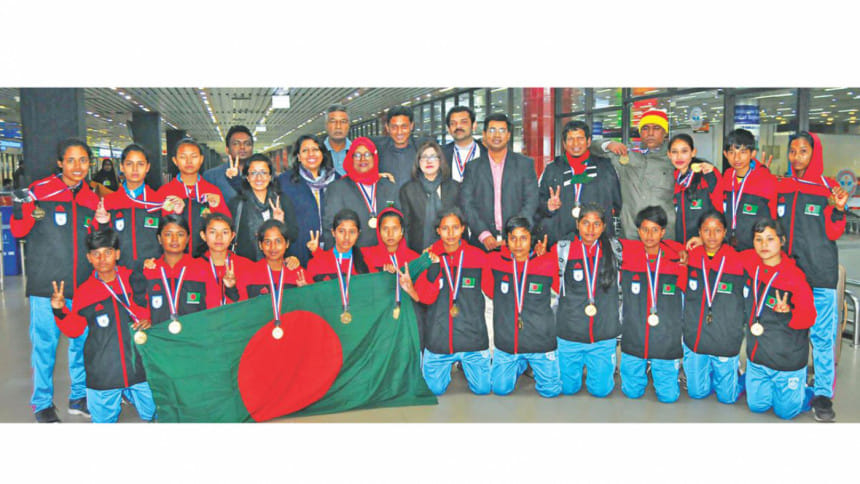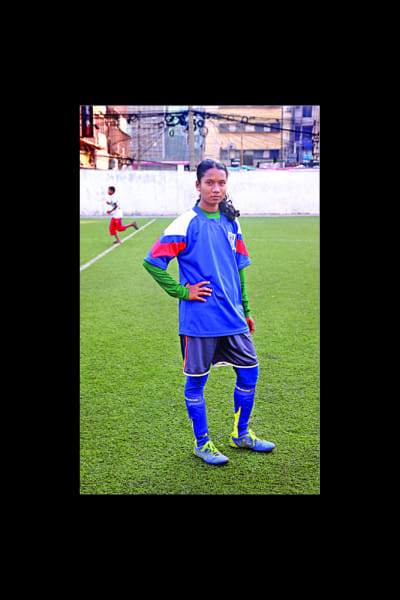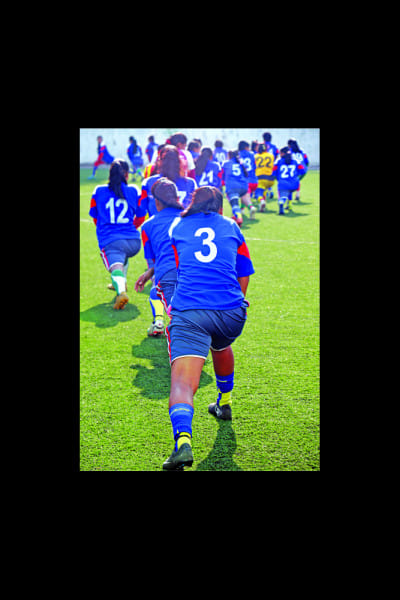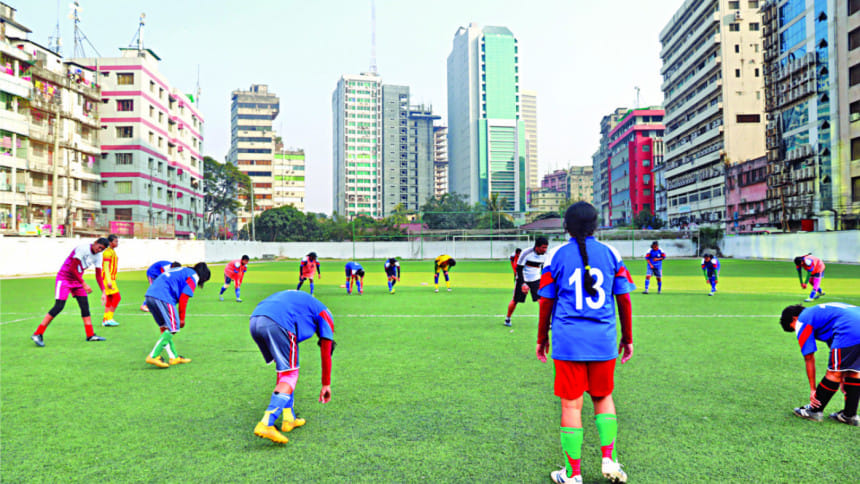SHE AIMS SHOOTS SCORES!

Photos: Kazi Tahsin Agaz Apurbo
December 20, 2015.
History was made at the Nepal Army Physical Training Centre in Kathmandu when the referee blew the final whistle, hands indicated towards the mighty team of red and green.
While throughout 2015, mostly undesirable incidents made breaking news on TV channels and newspapers, this bunch of young Bangladeshi girls made the U-14 football team that has blessed the country with the joy of triumph as they beat host-nation Nepal by 1-nil to Bangladesh at the AFC U-14 Girls' Regional Championship.
History was made the moment they clinched their first international title for Bangladesh at any level of women's football.

"We were aware of the fact that Nepal team is quite strong and we took preparations accordingly," says Marzia. "The day before the match, our coach Golam Rabbani Chhoton and assistant coach Mahbubur Rahman Litu showed us a match played by Nepal and India and helped us recognise their weak points," she continues. "From the very beginning, we took control of the match as we kept the opponent's defense busy with frequent attacks."
At the 16th minute, when Marzia, who had already netted four goals in three matches, scored the first goal of the match, gathering a precise assist from Nargis. The anxiety levels of both teams started to rise. "You cannot say anything with one goal. A slight edge of fear and uncertainty was there, but we were quite sure that we would win the game," adds Nargis.
Nepal searched persistently for an equalizer but they failed to achieve. The Nepalese team is quite strong, every player of the Bangladeshi team agrees with that. Also, the kind of atmosphere surrounding the stadium -thousands of fans chanting and jumping for Nepal - was not quite conducive for the visiting team. But nothing could break their focus. They were in the finals and they had to win the game – that was the only mantra they kept repeating to themselves and each other.
The moment the nerve-wracking final came to an end, Litu, assistant coach of the team, handed over the national flag to the girls, sparking celebrations in the field as the players and staff mobbed the winning team.
What made the young women, aged 13 to 14 years, so confident about their victory? Their consistent performance throughout the series against Bhutan (16 – 0), Iran (2 – 1), and India (1-1), could be part of the reason, but it was mostly their determination and hard work that did the trick.
"Our celebrations in Nepal did not last for too long. We rushed towards the green room to change our jerseys as we had to catch our flight in the next two hours to return to Bangladesh," comments Chhoton, Coach of the winning team. After this historic win, another rush of celebrations took place at the airport. These girls, who are still in their teens, are now seen giving interviews and facing the media. However, they are yet to celebrate with their family as many of them have already started preparing for their upcoming South Asian Women's football league to be held in February.

"Going home can wait, practice can't," states Krishna, the little captain of the winning team, with firm determination etched on her face.
"I have always been a football buff throughout my life. When I started practicing football in Kolshundor village, we used to play in salwar kameez on the school field in the afternoon with Mafiz sir. Everything used to be so different compared to the strictly disciplined life that we lead here in the camp of the Bangladesh Football Federation, but one thing stays the same: my determination to do something for the country by playing football," adds Sanjida.
Here in the BFF camp, the girls wake up at the crack of dawn everyday and swiftly make their way to the field where the practice sessions are held.
"We have limited fields as many different sport teams come to practice here," says Chhoton. Their turn starts at 6:30 in the morning. After two hours of practice, they come back to the camp, have their breakfast and sleep till noon. After lunch, the second round of practice begins for another three hours.
"I don't think anyone sleeps at 9 pm in Dhaka. We do," says Nargis with a laugh. In the evening, once practice is over, they have a study session. You can sometimes find them dancing and giggling to shows on the television.
Their love for football does unite them in their goal to play and win but they all have another thing in common- their willpower to prove detractors wrong.
"Neighbours would sometime tease me for playing a 'boy's game," says Krishna.
"Don't forget to mention about people whining that 'girls should not be allowed play football wearing shorts'," adds Moushumi, laughingly. "If they fall down and get injured no one will marry them," taunts the coach. "If they don't fall, and only play, no one will marry her anyway," adds Sanjida, remembering the taunts that they were forced to face.
The scenario has changed quite a lot with this victory. Now their neighbours and acquaintances flock to the town bazaar to catch a glimpse of the match on TV; the people of each girl's locality take pride in them.

"Throughout the tournament, the only time we were actually scared was when the earthquake hit Nepal, that too the day before our final match," remembers Swapna. "We were at a huddle, preparing for the match when suddenly everything started to shake. We started crying. Our coach and assistant coach did not leave our side for even a second. Our manager made sure to grab all our passports with her," she adds with a shudder. Later, a Bangladesh Air Force cargo plane brought them back home.
As soon as they were able to move beyond the trauma of this experience, they started practicing for the final match. It was football which dragged them into the deadliest few hours in their lives; then again it was football that healed them.
Of the 18-member squad, 10 players hail from Kalsindur, Mymensingh, five players are from Rangpur, while the remaining three are from Rajshahi, Shatkhira, and Rangamati. Nine players have also been in the training camp of the National Women's team for the South Asian Games.
As Kalsindur village takes over the headlines of the country's leading newspapers, Mafiz Uddin and Headmaster Minoti Ranican be seen at the helm of these successes, as the coach, manager and supervisor of the team in Kalsindur.
"The days of squinting in disapproval and disbelief and getting apathetic reactions from people are over; the village now takes immense pride in the girls," says Mafiz Uddin.
Just five years ago, the team actually started playing football on a local level with the Bangamata School Tournament. In the last two and a half years, they have bagged quite a number of winning trophies, starting from the above mentioned school tournament to interschool, regional and national championships, and finally, the FA under-14 championship.
"My love with football started from when I was very young, but I could never fulfil my dream of being a national level player," says Mafiz Uddin. He coached boys of his school in football from 2009 to 2010. Gradually, he started coaching the girl's team and the rest, as they say, is history. At present this remote village has become the hub of women's football.
"I dreamt of forming a girl's team who could deliver international standard performance. With their hard work and determination, the girls could actually do that at such a young age. I dream big now, I wish to have an academy dedicated for women's football players and their development," adds Mafiz.
Back in Kalsindur, the team and their coaches do have some complaints, mainly regarding to the fields where they have to practice. "The girls don't even have a proper football field to practice on, let alone proper attires and sporting equipment. Private companies could take this as a part of their CSR and sponsor their uniform or other such material needs, thereby encouraging more women to take up football seriously," says Mafiz.
Like Mofiz Sir, coach Chhoton too believes that the scenario has changed over the past few years. In fact, more and more women are participating in sports these days and both the print and visual media are covering women's sports, according them the same importance given to men's sports teams.
This was not a serendipitous victory, believes the coach. "I believe each one of these girls is capable of doing something even bigger than this," the proud coach concludes with hope in his eyes.


 For all latest news, follow The Daily Star's Google News channel.
For all latest news, follow The Daily Star's Google News channel. 


Comments